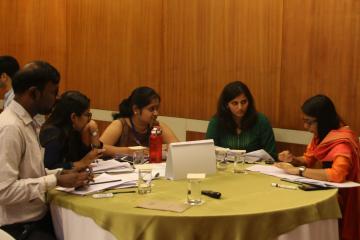Strengthening Our Work
J-PAL fundamentally seeks to reduce human suffering in all its forms, and promoting the dignity and agency of all people is a very important part of this mission. We know that our work achieves greater results when it is informed by a broad range of perspectives that reflect the range of communities in which we work.
Guiding principles
|
Representation Our work will be stronger, more relevant, and more likely to translate into action if it is informed by a wide range of perspectives, and from researchers, staff, and partners working in their own unique contexts and regions. |
|
|
Equity Equitable access to resources, opportunity, and advancement is essential for people of all backgrounds. We commit to working actively to challenge and respond to harassment, discrimination, and abuse, and continue to strive to identify and eliminate barriers to full participation. |
|
|
A strong work culture A workplace in which everyone is welcomed, respected, supported, and valued leads to achieving greater results. We strive to foster a sense of belonging and an environment in which everyone can fully contribute their perspectives and those perspectives are carefully considered. |
Our goals
We are working toward strengthening our research network and staff across many dimensions, including:
- Broadening the range of perspectives in J-PAL’s staff and research network; and
- Ensuring all staff feel welcomed, valued, and empowered in the workplace, positioning them to achieve greater results.
Reflecting the global nature of our work, researchers in the J-PAL network are based in dozens of countries and have carried out more than 1,200 studies in more than 100 countries. We have opened regional research centers in Africa, Europe, Latin America and the Caribbean, the Middle East and North Africa, North America, South Asia, and Southeast Asia, with leadership and staff from those regions. Similarly, our hundreds of policy, implementation, and funding partners are based in dozens of countries.
Discrimination, harassment, and abuse have no place in our work and are not tolerated. Learn more about our code of conduct and expectations for members of the J-PAL community.
Ongoing efforts
MicroMasters and Master’s in Data, Economics, and Design of Policy
J-PAL and MIT created the online MicroMasters in Data, Economics, and Design of Policy (DEDP) in 2017, followed by an in-person Master’s in DEDP as a new model for higher education. The MicroMasters’ personalized income-based pricing structure decreases financial barriers to enrollment. To date, more than 350,000 learners have participated in the DEDP MicroMasters program, and over 60 percent of enrolled learners come from low- and middle-income countries. The master’s program features a unique admissions process designed to level the playing field by ensuring admission is based on indicators of academic engagement and performance directly relevant to the degree program and by providing need-based scholarships to a number of participants.
We are continuing to build MicroMasters partnerships with universities in Africa, Latin America and the Caribbean, and Asia to further increase access to higher education for students in those regions, and are actively fundraising for MicroMasters and Master’s scholarships to enable participation of more learners from underrepresented groups.
Affiliate nomination process
Members of J-PAL’s affiliate network are invited each year to nominate peers to join J-PAL’s research network as an affiliate or an invited researcher to a specific region or initiative. Our annual affiliate and invited researcher nomination process explicitly calls for candidates from all backgrounds, especially those underrepresented in the field of economics to apply to this role. Nomination materials are standardized to ensure candidates are evaluated across similar benchmarks, and we are actively undertaking efforts (such as the J-PAL Scholars Program described below) to expand and diversify the pipeline of eligible researchers.
Invited Researcher nomination process
Invited researchers are an important element of J-PAL’s effort to increase the number of high-quality randomized evaluations providing actionable insights on the most effective approaches to reduce poverty and improve lives worldwide. The more than 550 invited researchers in the J-PAL network are eligible to apply for funding from J-PAL or work with a J-PAL regional office to implement their evaluation.
We seek to recruit invited researchers from universities around the world, with particular emphasis on individuals from or based in a low- or middle-income country. In expanding our invited researcher program, we seek to build diverse networks of researchers around the world who are carrying out randomized evaluations, crowd in subject-matter expertise to J-PAL initiatives, and help researchers strengthen their research portfolio and advance their careers. Learn more.
J-PAL Scholars and Fellows Programs
J-PAL is invested in creating more opportunities to diversify and expand our worldwide research network. The J-PAL Scholars and Fellows programs enable researchers from low- and middle-income countries to drive the research agenda in their regions through the use of randomized evaluations. Learn more.
Strengthening the research and policy pipeline in Southeast Asia
J-PAL Southeast Asia (SEA) has established a strong research and policy pipeline in Indonesia to help build a culture of rigorous evaluation. To fill entry-level research, policy, and training positions, J-PAL SEA seeks out recent Indonesian graduates who have the interest and potential to do further work in economics and public policy. Staff participate in training and receive active mentorship during their tenure, including guidance in applying to graduate school. Eleven Indonesian J-PAL SEA alums have gone on or completed master’s programs in economics or public policy since the office was created in 2013, and a further ten Indonesian J-PAL alums are enrolled in or have completed PhD programs. J-PAL researchers have also partnered with more than thirty Indonesian academics on randomized evaluations in Indonesia, several of whom have subsequently launched their own randomized evaluations and continue to collaborate with J-PAL.
Launching careers in research and social policy
J-PAL employs hundreds of research assistants (RAs) to support our affiliates’ randomized evaluations. The vast majority of our RAs are from the countries in which the research is taking place; for many, the RA-ship provides their first professional research experience. RAs get hands-on experience with key aspects of the research process, including conducting literature reviews; managing projects; assisting with study design, surveys, and other components of field experiments; managing data sets; programming; analyzing data; creating data visualizations; and presenting results; among other activities.
RAs may also enroll for free in the online J-PAL/MITx MicroMasters in Data, Economics, and Development Policy, and those based at universities often have the opportunity to attend seminars and conferences. This exposure to research and the broader field of economics can help them formulate and refine research ideas for graduate school applications and funding, and help forge strong professional relationships that lead to career mentorship.
Many RAs go on to pursue PhDs, other graduate degrees such as masters in public administration or public health, and professional research roles, creating a pipeline of emerging scholars committed to rigorous research and evidence-based policy. Many former J-PAL research staff, including Martin Abel, Shawn Cole, Raissa Fabregas, Clement Imbert, Kelsey Jack, Namrata Kala, Daniel Keniston, and Nick Ryan, among others, have gone on to become J-PAL affiliates.


